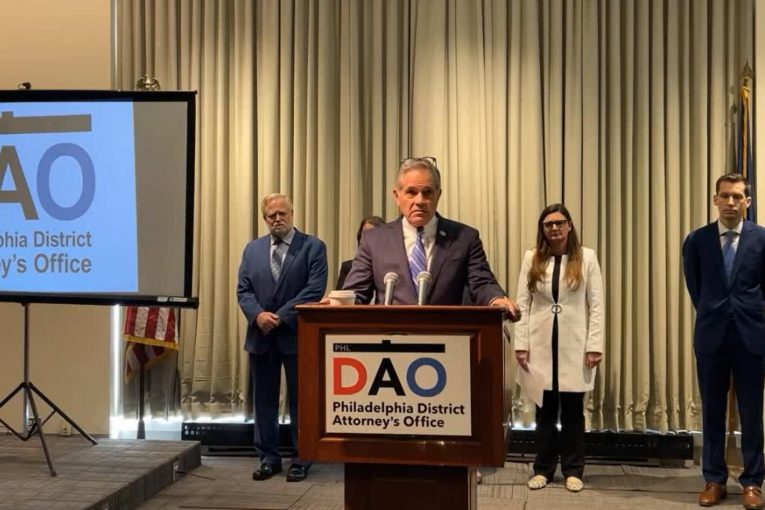

By David M. Greenwald
Executive Editor
Philadelphia – Larry Krasner announced on Monday at a press conference that the DA’s office, earlier in the day, moved to drop all charges against Charles J. Rice, whose conviction and sentence for a 2011 mass shooting in South Philadelphia was vacated by a federal court last November.
At a hearing on Monday before the Philadelphia Court of Common Pleas, the Hon. James Eisenhower granted the DA’s motion to nolle prosequi (unwilling to pursue) all charges against Rice for the September 25, 2011, shooting upon a Point Breeze residence that injured a young man who was affiliated with a violent neighborhood group, along with his mother, sister, and young cousin. Rice was 17 years old at the time of the shooting.
Following a jury trial in 2013, Rice was convicted of four counts of attempted murder, aggravated assault, and related offenses, and sentenced to 30 to 60 years of incarceration.
Assistant District Attorney William Fritze, chief of the Gun Violence Task Force, led the investigation and made a recommendation to the DA’s Sentencing Review Committee that the Commonwealth would not be able to meet its burden of proof if it were to re-try Rice for the shooting.
the Commonwealth would not be able to meet its burden of proof if it were to re-try Rice for the shooting.
“This is not typically the role that I play within these types of cases and usually I am here to announce that we were going to arrest some group or gang,” Fritze said. “We actually were asked to take over this investigation and look at this case as though it was a new case coming to us, which is something that we do at Gun Violence Task Force, and we did that because there was an assumption that there was a connection between two rival gangs in South Philadelphia in regards to this case.”
He said that “while we conducted our investigation, it became pretty obvious to us that we were not going to be able to reach the burden of reasonable doubt in this case in order to proceed.”
He called this the battle of the two alibis, with Rice found guilty while his co-defendant was found not guilty.
The co-defendant had a very solid alibi that was on video and Fritze said, “I believe the jury thought that perhaps there was more there and that was the reason to find him guilty.”
He added, “This case came down to one eyewitness who came off credible on the stand. Part of that credibility came because she was testifying on behalf of her children.”
However, when investigators looked at the testimony, they found issues with the identification.
They also reviewed the 911 and “what we know from the testimony is that the victim actually flipped over onto her children and looked back towards the shooters. And so that was her identification that she provided. However, there was an individual on the 9 1 1 tape who was on that same block and was able to look out the windows as the shooting was occurring.”
This individual said “there was one shooter with a blue shirt and blue jeans and that was not, there was never any other testimony regarding that, and that was not anything that was followed up on with that individual.”
He said this gave them “pause” and “the same kind of pause that creates reasonable doubt.”
Fritze concluded from their investigation, “I cannot say today that Mr. Rice was not there, but I can say that I would never be able to meet my burden of proof to be able to move forward with this trial.”
Nilam Sanghvi, the Legal Director, The Pennsylvania Innocence Project, noted, “CJ Rice’s case unfortunately involves factors all too common to wrongful convictions, a mistaken eyewitness identification, constitutionally ineffective assistance by his defense lawyer and overreach by the prosecution in presenting to the jury a theory of an alleged motive that we know has never been substantiated and has no foundation in admissible evidence.”
DA Larry Kranser noted, “Part of this is a story about the proper compensation of court appointed attorneys.”
He was not speaking about the Public Defender’s Office who said that “despite the fact that they’re undercompensated is well-resourced in terms of those attorneys being able to render more effective representation of defense counsel.”
He related his work on death penalty cases when he would accept court-appointed homicide matters.
He explained, “It was worse than working for free because you were actually paying for overhead in your office. You were trying to do the best job that you could as the Constitution requires, and it was a constant fight, a – for adequate funding, which there wasn’t, and b – for there to be any funding at all.”
He said, “We should not lose sight of the actual cost of underpaying attorneys to represent defendants when the rest of their life is at stake. When there’s been a horrific crime committed against another individual, we should not underestimate the cost. And we should also realize that what happens over and over and over when you have inadequate representation at the trial level, because it’s what you pay for.”
Krasner also noted, “I also want to acknowledge the manner in which Mr. Rice’s mother, a DAO paralegal at the time of his arrest, was treated by this office. All defendants are presumed innocent unless or until proven guilty beyond a reasonable doubt.”
He explained, she was fired in 2011.
“She was fired for what? Because her son was charged with homicide. How does that work? Who does something like that? When did we have a system of guilt by association where if you’re related to somebody you get fired?” he said.
Krasner added, “Well, that was the kind of thing that frankly this office stood for. It stood for the notion that if you weren’t guilty, maybe you did something else. And I heard prosecutors say that when I was acting as a defense attorney at that time, this notion of collective guilt is antithetical to what our constitution requires and what our law is.”
Krasner pointed out that his office has been involved in nearly 45 exonerations of 43 wrongfully convicted people.
He said that “it’s my opinion that probably 85% of the people, 85% of the cases that I’ve heard about are ones where we have very good basis for believing the defendant was innocent. But there is another 10 or 15% where we just don’t know. And I believe this falls into that category. We just don’t know.”
He added, “But the case has no integrity, and if it has no integrity, it would be a violation of my oath to leave someone sitting in jail on a case that has no integrity.”






